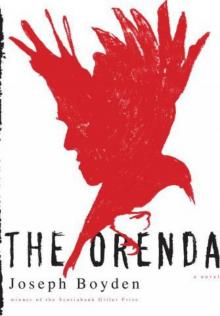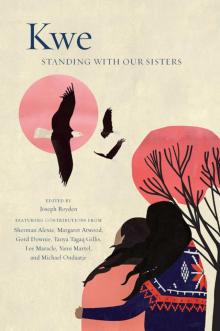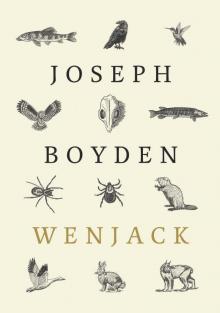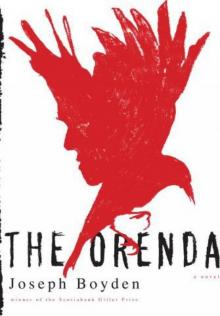- Home
- Joseph Boyden
Kikwaakew
Kikwaakew Read online
Kikwaakew
Joseph Boyden
printed by Coach House Press, Toronto
2012
Table of Contents
Front Cover
Title Page
Table of Contents
Subscribe
Kikwaakew
About The Walrus
Copyright Page
If you enjoy this book, please consider subscribing to The Walrus. To subscribe online, visit our website at walrusmagazine.com/subscribe
“The Walrus is one of the best things that has happened in Canada. It’s very rare, an outfit like this, informed by integrity, vision, and dedication. Please help The Walrus survive. We need it.”
Leonard Cohen - poet, singer-songwriter, and author
LISTEN TO ME, NEPHEW. Hear me.
Xavier snowshoes, his breath white puffs. His eyelashes hang heavy with ice crystals, so that the stretch of frozen creek ahead glitters and the single line of the spruce up the bank becomes many. Pulling off one mitt, he presses his fingers to each eye to melt the ice. This world can be beautiful. But it has never been easy. He’ll go another hour, him, and then start a small fire and boil water for his tea balosse, stir in sugar and lard and some flour. That will keep him going the rest of the afternoon. It’s kept him going for years. For now, he trudges along, occasionally cutting up the bank to where he’s set a wire snare or built a cubby set, hoping for something. A fresh rabbit for dinner tonight would be good. He’s tired of boiled beaver.
He’ll walk the eight or so miles up this creek today, checking his traps as he goes. Tonight he will shelter at one of his temporary camps before crossing through the bush to his other creek and snowshoeing back to his main winter askihkan by tomorrow night. Moving is better than sitting, even if the chance of snaring a single hare in this brutal cold is slim.
Sitting by the fire in his camp had gotten to be too much for Xavier. He’d sleep too long, till he felt the laze slip over his real leg, or until he was jolted awake by the dreamt crack of a Mauser or the whine of a big shell coming down into his trench. Now there’s another war over the sea that has no glimmer of ending, one just as brutal in its own way as the first, this one being fought against the same enemy as before. Does no one learn?
He would be lying to himself if he didn’t admit that he’s as excited as a child to be out on the lines. The winter had started off in the best possible fashion. With the first snows, he had come across fisher tracks not a day’s walk from his home. The animal has become so rare that one pelt is worth more than a whole winter’s catch of marten. One fisher pelt will make his year and allow him to buy his twins their own trapping gear and get them on their way. They’re at the age where they’re ready.
He tried everything the first weeks of winter to lure that fisher into one of his traps, using the choicest fish or moose guts tucked deep into the little spruce house of one of his cubby sets. He was extra careful to cover any signs of the leg trap at its entrance, the jaws spring loaded and ready to snap at the slightest pressure. A fisher can smell even frozen meat from a long way away. The secret is to tempt it enough to enter the cubby, only a couple feet high and a few feet deep. To get to the meal near the back, the animal will have to step into the false den and, with luck, onto the flat plate of the trigger. The leghold will then snap shut, doing the work it was meant to.
This is an especially wary fisher, though. Xavier had studied its tracks those first weeks of winter, circling the different cubby sets and trying to find another way to get at the meat. It’s too smart to go the obvious way. And now the tracks have disappeared entirely. He’s worried it has decided to move on.
These few weeks have been hard, even though he’s used to being alone. His Auntie Niska came to visit but then took her sled team back north. Promising she’d return soon, she told him she needed to use the shake tent and offer some prayers. Something’s coming, Niska had said just before she decided to leave. She’s not sure what it is, but it doesn’t feel right. Two nights before she left, Xavier woke up to her shivering in a fit. All he could do was place a rag between her teeth and make sure she didn’t hurt her head. When Niska came out of it, she was weak as a baby. It’s been a long time since one of her seizures. Xavier, he’d hoped they were gone for good.
There’s been no snow for a week, just bright sun above and the frigid temperatures of late January that come with it. So cold that even the marten don’t want to venture out lately. Wind’s going to change, though. And his luck with it. Good luck has been hard to come by the past years. He figures he’s meant to spend his life alone.
Hear me. Stop feeling sorry for yourself.
His two boys are due to come and help him with his work any day now, help him build new sets and check the frozen beaver ponds, the more distant marten traps, the rabbit and fox and moose snares, help him pull out and reset his gillnets under the ice, help him with all of the difficulties a one-legged trapper faces. After twenty-five years, Xavier’s gotten good, him, walking on snowshoes. He’s had one leg far longer than two. But anyone who knows him knows the drag of the left leg, the awkward slant of the snowshoe print dug in the snow. He’d be easy to track. He laughs to himself at the thought of the animals getting wise to him and following his trail for once. Maybe the fisher is peering out from the tamarack and spruce at him right now.
A few miles down the creek, he spots a couple of sharp-tailed grouse sitting high in a spruce, their feathers puffed out against the cold so they are round balls. He considers their worth to him on this day, with his pack lighter than he likes and the weather so harsh. Slipping off his mitts and then the pack from his shoulders, he unties his .22 carbine, opens the action, and slips in a round. If he angles himself right, he won’t waste. The birds sit dumbly in the tree, not daring to move for fear they’ll give themselves away. He walks to the centre of the creek so the two birds are lined up.
He raises his rifle, his hands already cold, and sights in on the front grouse. The wind blows slightly from the northeast, and the birds are far enough away that the small round will drop by the time it makes its way to the first bird’s head. He raises his sights just above it, breathes in deep, releases fully, breathes in again, then allows half his breath out. The rifle settles steady in his hands, and he pressures the trigger as lightly as he can. The rifle cracks, splitting the cold day open for just a moment. The two birds fall from the spruce, one to the ground with a thump into the snow, the other halfway down before it gets caught up in a branch. Ahh! Gi-jisk! He leans the rifle onto his pack and makes his way up the bank to the tree.
Taking hold of the trunk, he shakes it with all he has, the spruce swaying some with the effort. The stuck bird eventually falls, snow from the branches sprinkling his face, a little of it melting on his warm skin and slipping down his back. He picks up the birds and walks them to his gear. He will eat something other than boiled beaver tail tonight. Miigwetch.
THE EVENING COMES QUICK, in these short days, and Xavier’s glad for leaving firewood by the door of his temporary camp the last time he was here. He’ll remember to collect some tomorrow at dawn to replace what he uses tonight. From the outside, this little askihkan looks just like a beaver lodge and not much bigger, but this one rises up on dry land in a snowy mound in the midst of a ring of thick spruce, protection from the wind. The Cree have learned a lot from the beaver, their hard work and how to make winter homes from woven sticks and mud and bark. This one, once he digs out the snow to pry the door open, is much bigger inside than it appears. He can almost stand fully in it, and the fire ring in the middle is big enough to keep him plenty warm tonight, the dried spruce boughs of his old bed now perfect for kindling.
He starts a fire and hangs his kettle filled with snow above it before going back outside t
o cut fresh boughs for his bed. His home is filled with smoke when he returns. He clears the chimney hole so that it begins to draft nice. He adds more snow to the kettle and unpacks his bag, pulling out the lard and flour, the tea, the sugar, and his enamel cup and plate.
Untying the birds from his pack, he considers laying them flat on their backs, stepping on their wings, and pulling them out of their feathers. He’s hungry, but to waste the meat, even that little, makes him feel guilty. He plucks each bird carefully, keeping the bodies intact. He guts them and removes their heads, then skewers each one on a stick, placing their thin bodies above the fire to cook. His kettle’s boiling now, so he makes tea, adding a spoonful of sugar, then lard, and finally some flour.
After dinner, he rolls up his pant leg to above the knee and unstraps his prosthetic, saying that word in English, after all these years still enjoying the way it spits from his mouth. Earlier, when he first reached the camp, he removed his snowshoes and planted them upright in the snow just outside his door. Niska had taught him as a child to do this so that the dreams that come in the night would be filtered, the good getting through, the bad ensnared in the gut webbing to be burned up in the morning light. Some habits become like prayers if you stick to them long enough.
Rubbing his sore nub, he tries to sleep. But he keeps hearing footsteps near his camp, loud enough, big enough, that he can make them out over his crackling fire. At first, he thinks it might be wolves, their hunger bringing them to the scents of him and his camp. There’s no wind tonight, and the sounds travel. It isn’t wolves. He considers the possibility that some other human, another Cree or maybe a Hudson’s Bay Company trapper, has crossed into his territory. But they all know where his lines are, and he has seen no hints of men nearby. As the night grows deeper and the sounds still echo out every little while, he begins to wonder if it isn’t some of his friends from the war, long dead, come to find him. His tension loosens then, and he begins to doze off, only waking to stir and feed the fire.
Before dawn, he jolts awake. It isn’t a sound that rouses him, though. It’s an image, fuzzy in the darkness as light threatens to crawl pink over the edge of the world. Whatever this is that haunted him last night, it’s out there, and it isn’t a friend. It waits in the trees just beyond where he can see. It is thick shouldered and muscled. Its legs and neck are powerful. He can make out that much in the haze of his half-dreaming. He knows it watches his camp, waits for him to crawl out so it might weigh him, make a decision as to what it faces. Today will be the coldest yet. He can tell by how his breath hangs in the air in front of him, despite the proximity of the coals in his fire.
CUTTING THROUGH THE BUSH is tough on him this morning. No packed trails to follow, and in the shadows the snow’s deep. He’s not felt fear in a while, him. Something’s watching his movement. There’s no point looking around for it, though. It doesn’t want to be seen. Niska’s done this to him before, when she works her shake tent especially strong. She calls in the spirits of her dodems, her special animals, and they come to her. She’s asked them to do something, he figures. Maybe find out why the game is unhappy, if she or Xavier or his two boys have done something to insult them. Whatever’s watching doesn’t feel flesh and blood. Doesn’t feel physical. But that’s what’s scariest, isn’t it?
You’re fine.
Back out on his second creek, with the sun bright and the walking easier, he feels a little better. He cuts up the bank and into the bush and checks his snares into the early afternoon. Nothing. Only a few fox and rabbit tracks. He almost doesn’t check his last few cubby sets as the afternoon gets late. He’s cold and needs to warm up. But the thought of the fisher, the slim chance that he might have gotten it, forces him up the bank and into the woods.
On a trail he’s had good luck with earlier in the winter, he spots the tracks. They make him stop, kneel down, and take off his mitts so he can trace a print. Without wanting to, he looks over his shoulder. It’s come back. After all these years. He stands and follows the steps to one of his traps, the spruce cubby torn apart, bits of wood and bark scattered about, the leghold sprung, its jaws clenched and empty. The fish guts he’d hoped would lure in a marten are gone.
He kneels again to verify what he already knows: Kikwaakew. A wolverine, a very big one by the size and depth of its prints, has come to take away what he has tried so hard to harvest. He travels farther down his line, and the next three traps are destroyed as well, the bait devoured. Kikwaakew has come to ruin his winter.
XAVIER’S ALMOST BACK to his camp before he sees that a fire’s been lit, the deep-freeze of the late afternoon turning the chimney smoke above his askihkan into a thick white line that hangs heavy above it. His sled dogs have returned and picked up his scent, baying out their greeting, pulling at their tethers to try and jump on him as he walks up to his door, grinning. His two boys have returned. They are safe, and they are here.
The three of them stay up late into the night talking, his twins full of stories. Three weeks ago, he had agreed to let them use his sled team so the boys could serve as runners between the Hudson’s Bay Company men and the trappers scattered over a few hundred miles.
“North of Albany, we came across a half-eaten moose,” Antoine tells Xavier.
“The kill was fresh,” Abraham adds. “Grey wolves.” Xavier watches as Abraham looks to him for approval. Abraham’s always been this way, needy of the constant nod to prove he is worthwhile. He came into the world a little bit simple. Despite the boys’ being identical, Antoine is the opposite in spirit to his brother, assured and self-contained, needing nothing from anyone. This is how he can tell one from the other when he is in doubt.
“We knew the wolves were close, because the carcass was still steaming,” Antoine continues. He pauses before telling the next bit. “I grabbed my axe and walked quick as I could, following their trail.”
“Father!” Abraham says, excited, jumping in. “Antoine chased down a wolf that was so full from the kill it couldn’t run from him. He brained it with his axe!”
Xavier raises his eyebrows at the story. Antoine looks angry that his brother has told the best part. Xavier watches as Antoine looks into the fire, biting his tongue.
“Perhaps, then,” Xavier speaks to Antoine, “you can help me brain something else.” He looks to Abraham as well. “I need the help of both of you.”
IN THE AFTERNOON, the boys come back to report what they’ve found. It’s worse than Xavier thought. Kikwaakew has spent the past days working its way through a portion of his lines, stealing the bait as it destroys the cubbies and escapes the snares.
“It drags one of its back paws,” Antoine tells him as they work removing a gillnet from the frozen lake, Abraham chopping out the hole forty yards across from them as they do the same here.
“Maybe it escaped one of my snares,” Xavier says.
Antoine’s lack of answer to this reminds Xavier of himself. He senses Antoine looking at him. Antoine wants to tell him something. Instead, the boy turns back to working the net from the hole.
With the suckers and mooneyes they catch, the sled team will eat well tonight. Xavier watches as his two sons compete with each other to see who can go longest freeing the fish from the net without having to stop and warm his hands in his mitts. His brother as a young man was his best friend, Elijah. Xavier sits in the snow gutting fish, thinking about this, something he rarely allows himself to do. His brother, his best friend, is long dead. In honour of that, Xavier almost named one of the twins after him. For reasons he still can’t speak out loud, he decided not to.
At evening supper, the boys ask for beaver tail. Apparently, they’ve been living on too much bannock and tea. They’re starved for the meat and fat, Xavier sees. While the land animals have been furtive these past weeks, the beaver have been active, and he has captured many of them in the underwater snares he has placed by the openings to their lodges. The young ones are always the first to be most daring in leaving the lodge to swim under the ice
, and he has chopped through the ice and pulled up a dozen in the past week.
Each of them sears a full tail over the fire, bubbling the skin, turning the tails constantly. It doesn’t take long. Xavier’s careful not to let the fat that begins to spittle up and split the blackening outer layer go to waste and drip into the flames. He pulls his from the fire first, acknowledging the pain in his fingers as he removes the burnt covering from the meat. For just a moment, the memory spurts from somewhere, pusses out like a festering wound. He reaches down into the mud to pick up a wounded man, but the man’s skin, seared by the heat of an exploding shell, tears off in his hands.
You’re fine. The pain of that world is gone.
When the skin’s all removed, he drops the naked tail into the boiling pot, his sons following suit.
Xavier surprises himself after the meal by speaking. He’s unaccustomed to his own voice. “I’ve been tracking a fisher, me,” he says. He immediately feels self-conscious for having spoken of this. He fears it sounds silly. Both boys look at him. “I’m worried that kikwaakew will get it first and ruin my winter.”
He watches as the boys contemplate this. Finally, Antoine speaks. “How much does a wolverine pelt bring these days?”
Xavier shrugs. “A good bit.” He thinks. “A lot.”
“Then we’ll be rich when we bring both a wolverine and a fisher to the Hudson’s Bay men.”
The three of them laugh and stretch out, Xavier rolling and lighting a cigarette. In the fire’s low glow, he sees that both of his sons reach into their pockets and do the same. He wants to say something, that they are only sixteen and too young for this, but he remembers what he was doing at their age. Was forced to do. He was good at that, the killing.

 The Orenda
The Orenda Kwe: Standing With Our Sisters
Kwe: Standing With Our Sisters Kikwaakew
Kikwaakew Through Black Spruce
Through Black Spruce Three Day Road
Three Day Road Born With a Tooth
Born With a Tooth Wenjack
Wenjack Louis Riel and Gabriel Dumont
Louis Riel and Gabriel Dumont The Orenda Joseph Boyden
The Orenda Joseph Boyden